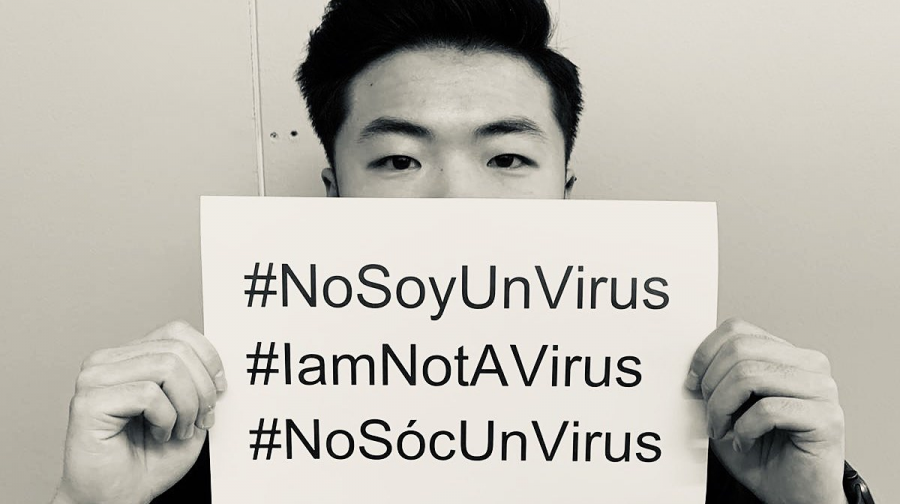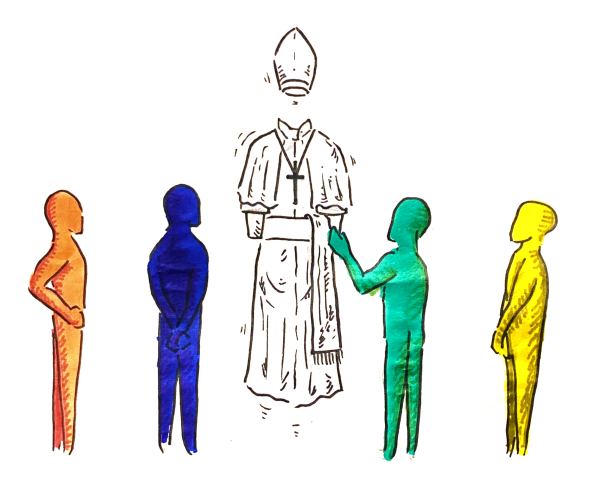Conditionally American: The Rise of Anti-Asian Racism Amid COVID-19
Jia Liang Sun-Wang, via Twitter
Jia Liang Sun-Wang, based in Spain, holds a sign in response to coronavirus-based discrimination.
The COVID-19 pandemic has struck constant fear into billions of lives around the world. Families have been distraught over loved ones whom they now cannot approach. Millions have been left without jobs, money, and food, while also being locked away in their homes, losing their autonomy and freedom.
However, many Asian Americans face unique fears: racism, xenophobia, and the physical abuse that can derive from those sentiments. Reports of racism against Asian Americans started as sparse cases; however, they have risen dramatically.
According to National Public Radio (NPR), coronavirus-related hate crimes against Asian Americans have spiked dramatically: “In the last two weeks of March, 1,100 incidents were documented by the Stop Asian American Pacific Islander (AAPI) Hate reporting center. Incidents ranged from verbal attacks and spitting, to violent ones, including a brutal stabbing of an Asian American family in Texas and an acid attack on a Chinese-American woman in Brooklyn.” Recent viral videos have shown an elder beat down in San Francisco and a middle-aged man stabbed to near-death in Brooklyn. In Washington, D.C., Yuanyuan Zhu was approached by a man who yelled, “Run them [Asians] over!” as a bus passed by and later spit on her. In addition, reports have flooded the internet about letters encouraging Asian families to burn themselves alive and school districts have found racist and threatening notes to Asian families.
When interviewed by the New York Times, dozens of Asians Americans reported being terrified of racist attacks. Reports noted that many Asian Americans “were afraid to go grocery shopping, to travel alone on subways or buses, to let their children go outside, … [of] a sudden spasm of hate.” Han Chang, a restaurant owner, commented, “All my New York Chinese chefs are very afraid to leave the house. I would say probably 30% is because of the virus, but 70% is because of the hate crimes. They don’t want to catch public transportation and get beat up on their way to work.” The targeting of Asian Americans is reminiscent of the vicious hate speech and attacks against American Muslims and Arabs following 9/11.
I have never viewed America as a battleground where one is scared to step out of their door and has to watch their back in an attempt to avoid pervasive threats. Shouldn’t we stand together during times of crisis, because as Abraham Lincoln said, “A house divided can never stand?”
Actor John Cho wrote in an Los Angeles Times article, “The pandemic is reminding [Asians] that our belonging is conditional. One moment we are Americans, the next we are all foreigners who ‘brought’ the virus here.” He continued, “Never has our interconnectedness been plainer…you can’t stand up for some and not for others. And like the virus, unchecked aggression has the potential to spread wildly.” Cho and many others, including basketball player Jeremy Lin, are making their voice heard in an attempt to boost Asian American pride during a time when the population is feeling excluded. “Just accept us as humans,” Lin stated flatly on NBC News.
Despite the recent threats and attacks, members of the Asian American community have remained positive and responsive. Asian American communities around the country have spent time in their neighborhoods donating and raising awareness for COVID-19. For example, in New York, the Coalition of Asian American Children and Families (CACF) raised over a quarter-million dollars and donated upwards of 85,000 N95 surgical masks to doctors and hospitals.
Sometimes I wonder how Asians-Americans like me can keep our Asian pride, especially when I have never lived in China and visited the country nearly a decade ago. I wonder if there will ever be a day where the Asian community will unite and say, “We do belong” and “Treat us like the Americans we are.” One thing I do know for certain, however, is that pure hate will never cure a virus that wants to harm us all the same. And comments and abuse will never achieve the retribution one may seek. A period like the COVID-19 pandemic is a time for us to stand together: for each other and the well-being of everyone around the world. Now is not a time to relay hate or blame, but love and compassion.
While writing this article, I was reminded of a speech I once heard by Soledad O’Brien, an American broadcaster. O’Brien’s mother was black and her father was white. In the 1950s, when interracial marriage was illegal, the couple was frequently denied access to restaurants and spit on while walking down the street. However, O’Brien’s mother never lost faith; she said, “We knew America was better than that, and we knew we had to be [a] part of making it better!” Today, let us take the opportunity to stand up against hate and discrimination. Let us stand up for our friends and peers and advocate for what we believe is just. Let us all be a part of making America better.






